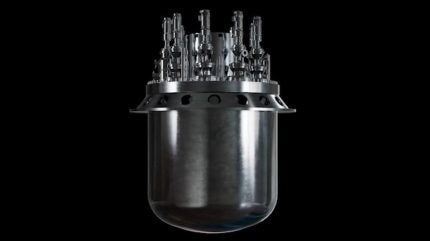
Swedish nuclear energy company Blykalla and Germany-based pump manufacturer KSB have announced a new partnership to develop specialised pumps for Blykalla’s SEALER technology. Blykalla founded in 2013 and formerly called Leadcold, is a spin-off from the KTH Royal Institute of Technology in Stockholm. Blykalla’s SMR prototype SEALER (Swedish Advanced Lead-cooled Reactor) design is a fast compact reactor with passive safety. Each reactor will have a 55 MWe capacity, which can be increased by installing multiple units at the same location. The reactor is designed with the smallest possible core that can achieve criticality in a fast spectrum using 19.9% enriched nitride fuel.
Blykalla says the SEALER is designed for commercial power production in a highly compact format, with unique safety features based on a number of proprietary innovations. These include corrosion-tolerant steel alloys, which enable the efficient cooling of reactors with liquid lead. “With this technological breakthrough, Blykalla can achieve effective serial production, leading to faster deployment and lower costs than conventional nuclear power.”
According to the company website, the SEALER reactor is designed to maintain a maximum temperature of the lead coolant below 450°C, making corrosion of fuel cladding and structural materials a manageable phenomenon, even over a lifespan of several decades. Blykalla’s goal is for its first 140 MWt SEALER-55 commercial reactor to be ready for operation in the early 2030s.
While the website has details of the overall design, fuel and the safety features, however, it says nothing about the fast reactor technology, which is currently only operational in Russia, where the world’s first ever lead-cooled fast reactor is nearing completion. Hitherto sodium has been used as the liquid metal coolant in fast reactors.
While research on fast reactors took place in the 1960s and 1970s in the US and Europe, things began to change in the late 1970s as concerns about scarce uranium resources waned and public opinion became increasingly hostile in the wake of the 1979 Three Mile Island accident in the USA and the Chernobyl disaster in 1986. By the early 1990s the US, the UK and Germany had closed down their programmes. France continued with its Phenix and SuperPhenix projects for a few more years, finally closing SuperPhenix in 1998 and Phenix in 2009, Subsequently, in 2019, France also cancelled the Generation IV ASTRID sodium-cooled fast reactor demonstrator design project. Although interest is now reviving in Europe and the USA both through collaborative projects and government support for private company initiatives, it remains at the early design phase and is probably decades away from implementation.
Blykalla says the new partnership contributes to a strong, strategic value chain for industrial development of key components for this technology. Under the collaboration, Blykalla and KSB will design, develop, and manufacture pumps capable of operating in liquid lead environments. Pumps are one of the most critical components in a liquid lead-cooled reactor, as their operational lifetime impacts the reactor’s overall need for maintenance and hence cost-effectiveness.
“We are very pleased to work with KSB, a global leader in their field, whose expertise and innovation will play a role in the development of our reactor systems,” said Blykalla CEO Jacob Stedman. “This collaboration is an important milestone as we continue to advance our mission of building Europe’s first advanced SMR.”
KSB’s extensive experience in providing high-performance pump systems for challenging applications is expected to ensure that the components will meet the specific demands of liquid lead-cooled environments.
“We are delighted to partner with Blykalla on this ground-breaking project. Our know-how based on experience out of decades in the nuclear industry and the knowledge in high-temperature equipment is a perfect match for the innovative SEALER technology,” noted Andreas Hefter, Vice President Nuclear Energy at KSB. “This collaboration is a significant step towards our vision of supporting a CO2-free energy generation, enhancing safety standards, and contributing to a sustainable future.”
This partnership underlines Blykalla’s commitment to working with leading global industrial companies to develop the SEALER, and represents a major step in the journey toward delivering reliable, advanced SMRs for the future energy market.
Together with Uniper, OKG, KTH and the Swedish Energy Agency (SEA), Blykalla also aims to build an electric research reactor in Oskarshamn supported by a SEA SEK99m ($9.3m) grant for the project.






